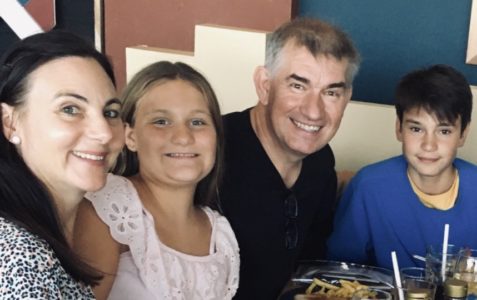
Alan Bowen waved goodbye to his family at Cape Town International Airport.
He expected to see them within a few months. It’s been over 400 days.
“I was living in Cape Town in South Africa,” Bowen says, “for the past 10 years.”
Bowen has been teaching maths “his whole life”.
His wife is a music teacher. He has two children, Jack, 15, and Holly, 11.
Two years ago Bowen’s father-in-law suggested he move to New Zealand and take his family with him.
“I felt the move to New Zealand would be a good thing,” Bowen says. They sold their house, resigned from their jobs and were prepared for the “massive change”.
On March 12, 2020, Bowen and his family parted ways at the airport.
The plan was for his wife and children to join him in May or June .
He started teaching at Macleans College who put him in contact with a lovely South African couple who would take him into their home.
Then Covid-19 struck. Five days past his arrival, the border closed to all non-residents.
By March 26, New Zealand was in lockdown.
“The doors opened,” Bowen says. “But not for my family.”
Bowen’s wife, Loren, has been unemployed since July.
The school she was previously teaching at allowed her to stay on for an extra month, but with restrictions tightening and the situation worsening, had to let her go. It’s been a “financial strain” ever since, says Bowen.
It’s been more than 400 days since Bowen has seen his family.
He says that teaching keeps him “occupied” and “busy” and that he “loves it”. Additionally, he enjoys sailing and being on the water.
“New Zealand is beautiful,” he says. “Everyone is kind and considerate. I hope to show my family what I’ve seen here.”
One of the most stressful parts, Bowen mentions, is missing important milestones. His son, Jack, is turning sixteen on April 23 and Bowen has already missed his 15th and his daughter’s 11th birthdays. “Christmas was hard,” he says.
On April 19 it was announced that hundreds of families will be reunited as border exemptions are widened. However the new rules applied to families of critical health workers still overseas, as well as a “small number” of highly skilled workers.
“Today’s move is a good start,” Erica Stanford, National Party spokesperson for Immigration, says. “But there is more to do.”
Bowen says he is happy that “all efforts and stories amounted to action being taken.”
He hopes this is the first step for the border exemptions to increase.
Additionally, he has applied for his expression of interest to become a resident so it’d make it easier for his family to be allowed into New Zealand. But they’re “still processing it.”
Bowen’s colleagues are facing a similar issue where they feel as if they are stuck in the frozen “expression of interests” pool.
Bowen says he “misses them terribly” but doesn’t regret moving to New Zealand.
“I feel privileged and happy to be here,” he says. “It’s wonderful.”










